Ukraine Dispatch: The Liberation of Kherson
Zarina Zabrisky was among the first journalists to set foot in the Ukrainian city of Kherson after its liberation from nine months of Russian occupation. This is what she saw, heard...and smelled.
By Zarina Zabrisky
Journalists at War
I was among 250 journalists fighting to get on the bus to Kherson.
The Ukrainian army had just liberated the city, and nobody was allowed to enter it. For a good reason, too—every nook and cranny was mined. Ukrainian authorities were conducting “filtration,” checking documents and looking for the Russian military in disguise hiding in every basement, the rumor had it. The roads to Kherson got destroyed by explosions and bombing.
Journalists didn’t care.
Journalists go to war zones for multiple reasons: Reporting history, documenting war crimes, writing human stories. Money — you can make a decent amount if you work for a big network and you get there first. (News is like exotic butterflies that live one day. No one wants yesterday’s news.) Fame. Wars could be a great PR tool. A certain sports-like competitiveness tinged with a high-school trophy-hunting vibe — who got there first, who’s cool. Trans-generational war trauma. And, let’s face it, the Baudelairian “Unknown,” the desire to rip through the curtain of what seems to be a reality, glimpse into the abyss, and catch the meaning of it all. The existential anxious drive pulsing in one’s veins. Cutting through the circumstantial garbage into the essence is way more feasible at war than at, say, a Starbucks in San Francisco. In a liberated city, life is stripped to the bare core. No light, no water, no heat, no food. Little space for bullshit. Add the adrenaline rush, which is addictive, and you got the idea of who were the 250 journalists storming three buses fit for 130.
Why me?
Why did I want to get to Kherson? Nobody is paying me big bucks for reporting; some magazines forget to pay at all. Not my kind of fame: since kindergarten, I dreamed to author big, thick books, the kind you read in bed, for hours, when sick. Transgenerational trauma? Sure. My ancestors were killed in Ukraine during World War II. Addiction? My partner once got drunk and told me I was addicted to tragedy — I can’t remember the precise words; I was drunk, too.
“It’s not your war,” my Ukrainian colleague once told me. He was wrong. I am at war with Putin and the KGB. Just like Ukraine, in the 90s, I ran away from Putin’s Russia to the free world — only to find out that Putin and his KGB goons are after us, obsessed with the idea to turn our new beautiful world into the dark prison we — Ukraine and I — had escaped. Possessed, cartoonish undead with their rusty Soviet-made tanks and WWII bombs; ugly, distorted faces; hammers and sickles; they did not steal “my home country” or “my birth city.” (Russia, with its rabid daily-life anti-Semitism and Slavic exceptionalism, has never felt like home to this Ashkenazi Jew. Neither did Israel; I know zilch about Judaism. In America, they always ask, “No, where are you really from?” I spent half of my childhood in Ukraine — not long enough to call it home. I have no home country. Nationality? Writer.) Putin did steal the graves of my parents; I can’t go clean the tombstones. It sucks — but ashes to ashes.
I am at war because Russia wants to steal Ukraine’s freedom, and mine, and everyone’s. Sure, you’ll say, but what’s freedom? You know freedom when you have learned what unfreedom is. It is one of those things. You realize how important electricity is after you live for weeks without light and heat. You treasure running water after the taps have stopped working months ago. You understand the importance of peace after living through a war. You know freedom if you have survived the Soviet Union. You will fight for freedom to your death.
Why Kherson?
Kherson was a journalist’s Klondike, a gold mine, even though no major battles happened here.
The southern city with a population of almost 300,000 got occupied by Russian troops within the first week of the Russian full-scale invasion in Ukraine. On February 24, the Kremlin started the war — which they called not war but “a special military operation.” In their minds, it was supposed to be “a three-day trip” to Kyiv, the capital of Ukraine, on a bogus mission of “denazification” and “demilitarization” of a sovereign country. There was little fighting for Kherson; the Ukrainian army did not expect this move and retreated. For about a week there was chaos. Then, the Russians came. The locals threw Molotov cocktails at the Russian armored vehicles and 17 civilians got killed. Russians rode all around the city on top of their armored vehicles with their machine guns. Kherson residents swamped the streets, screaming “Go home!” Russians shot in the air and used tear gas. Soon, there were no more protests. In May, I spoke to three men who had fled Kherson and I wrote about their life in the occupied city. Since then, Alexey, a long-distance truck driver, and a history major, joined the Ukrainian army. “I still can’t believe my city is free again,” he wrote to me on November 11, the day Kherson was officially liberated — again, without a battle. After almost nine months, Russians left, abandoning their armored vehicles. Ukrainians joke about the “Russian land lease.”
Kherson, the only major city the Russians seized during the war, is located at strategic point on the Black Sea and the Dnipro. From here, the invaders wanted to move on to Mykolaiv to get to Odesa, the seaport, and possibly to Transnistria, Moldova.
Not just that — Kherson had a symbolic significance. Putin used his favorite tool — sham referenda — and on September 30, 2022 annexed the Kherson region, along with the occupied parts of Zaporizhzhia, Luhansk, and Donetsk regions. A scary concert on the Red Square followed, with hundreds of Russians barking archaic chants. “Kherson is with Russia forever,” said Putin. “Navsegda.”
“Forever” ended on November 11 when Ukrainian troops took Kherson back, without a battle. The Russian generals and propagandists explained the retreat as a “sly maneuver” and a move to save the precious lives of the Russian soldiers. No one outside Russia believed it — similar “sly maneuvers” had happened in the Kyiv and Kharkiv regions before. Bodies of the dead Russian soldiers were left to rot in the fields. I have seen some, spread out in the indecent indifference of death, naked bones whitening through the amber of decaying flesh.
Kherson was the prelude to victory. Reporting from the newly liberated Kherson was reporting history. Everyone knew it.
On the Bus
When on November 14 — three days after the liberation; an eternity in the journalists’ world — the Kherson press tour was announced, every journalist in Ukraine was trying to get a spot. The only way to reach Kherson was on the bus. No one could get there by car: at the block posts, no accreditation (and I had four, one for Ukraine, from the Ministry of Defense, and one for each of the cities and regions nearby: Odesa, Mykolaiv, Kryvyi Rih, and Kherson itself, pending) would get you through. A couple of journalists who’d sneaked into Kherson had their accreditations revoked, which meant they could not cover the war in Ukraine anymore.
Everyone was there: CNN, the Washington Post, the New York Times, the BBC, you name it. The press tour turned out to be a great equalizer. Money or the name mattered not. It didn’t matter if Dan Rather or Walter Cronkite arrived at the gathering point at the square in front of the big park in Mykolaiv pre-dawn. There were 130 seats on two and a half buses (the small one was hardly a bus), and about 250 journalists in bulletproof vests, helmets, and with bulky camera equipment. It was an exercise in Darwinism — the fastest got seats, slightly slower ones stood for an hour-and-a-half ride, hanging off the ceilings, and the slowest were left behind in the half-destroyed and still bombed city of Mykolaiv, which nobody wanted to cover. Kherson was the shit.
I was pretty fast, even though I wore my heavy bulletproof vest with big white letters PRESS on it. The vest still smelled of the Izium mass graves I had reported from. I washed it five times, aired it outside for weeks, threw away the bag, wrote two articles, one scientific-ish, another literary, about the scent of decaying flesh, bought two types of perfume, but nothing would get rid of the smell. The gear costs around $1,000 so getting a new set was out of the question. I didn’t have a camera, though, and so managed to get a seat by the window in the tiny “half-bus.” Made in the USSR, rickety and dirty, it had tinted windows, but with my phone I could take photos of the ruined villages—and even Chornobayevka, a legendary village known as the “enemy’s portal to the other dimension.”
I was transfixed by a large Proctology advertising billboard in the midst of a bombed wasteland, trying to take a Great Gatsby photo when Victor, a journalist from Latvia, sitting next to me, said, “Hey! It’s Bandit Petersburg. The soundtrack. Listen!”
A faint annoying tune on the radio was vaguely familiar. I suddenly remembered: a soap opera about the Russian mafia in the early 2000s. Dreadful in every respect, the sleazy TV series featured an equally dreadful main music theme, a song called “The City That Doesn’t Exist.” A syrupy hit, with its shameless cheap lyrics about fate, hope, and such, could be the anthem of kitsch but its title managed to nail the very essence of the place that was chasing the survivors of the USSR — the country that doesn’t exist.
Why was it playing on the way to Kherson, the skeletons of houses and the cars squished into pancakes on the side of the road flicking by? Were we destined to be haunted by the ghosts of the Soviet past forever? Navsegda?
The bus twisted and turned, jumping over bumps and pits and risking rolling down into the mined fields; at one block post, we were stopped and told to return to Mykolaiv because the soldiers did not believe it was a press tour. Halfway in, I saw a big bus ahead of us almost tip over — but it didn’t. We made it to the main square in Kherson.
Kherson
The sky was enormous. If someone painted such a sky, it would be as kitsch and out of place as the Russian bandit tune on the bus. It was real, though: a high, trembling, piercing blue cupola of heaven, not sky, with fine white clouds soaring over the main square like angels’ wings. A golden-yellow and blue flag flapped triumphantly over the main building — every detail of this urban landscape carved into my memory as a metaphor, every mundane moment transforming into history, imbued with some visceral, crazy symbolism.
Women, men, and kids lined up on the other side of the square, waving flags, shouting, “Glory to Ukraine!” and I didn’t quite get why they kept such distance — until the national anthem thundered: “Ukraine has not perished yet! Neither its words nor its freedom! Fate will still smile at us, brothers Ukrainians! Our enemies will disappear like the dew in the sun and we will be ruling our own land. We will give our soul and body for our freedom and we will show that we are of Kozak kind!” and all journalists scattered back towards the main building: there, in between the two rows of soldiers, appeared a small figure in green.
“Zelenskyy! Zelenskyy! Glory to Ukraine! Glory to the army! Glory to the President!” chanted the crowd.
I realized that I was kneeling. I like Zelenskyy all right, but I would not kneel in front of any human being. The crowd of journalists with cameras and microphones was so dense and pushed forward so hard, though, with armed guards pushing us back, that the only way for me to film Zelenskyy was to get down to the ground, bulletproof vest and all. I couldn’t hear what he was saying, even though I was really close. I was hoping no assassins arrived on the damn bus; no one really checked my accreditation, after all, and I was close enough to see the stubble on the President’s face. The square kept quiet, with occasional “Glory to Ukraine!” shouts and distant explosions — demining? shelling? — I didn’t know — but Zelenskyy’s voice was coarse and he spoke quietly; only big networks managed to shove their microphones on the desk in front of him. I heard something about “a turning point in the Russian war” and “a symbol of a future Ukrainian victory” but I was not sure. He didn’t speak for a long time.
The sounds of explosions getting closer, and the President of Ukraine crossed the square. The locals were going wild. The entourage turned around and rushed to the cars. In a minute, he was gone. The explosions kept coming.
People
The rest of the trip went by in one long, delirious moment, kind of like the dreams material, when you float from one group of people to another, all faces fuse into one, someone is singing here and there, brilliant blue-and-yellow spots shining in my peripheral vision at all times, like flashes of some exotic city, explosions becoming more frequent, moving even closer, and every sound coming as if through the water because there was loud buzzing — generators working in the middle of the square and side streets.
Perhaps I was in dream mode because I’d only slept for one hour the previous night. We stopped in Mykolaiv, at a garage basement. The attempt to sleep communally did not work out for me. A big black cat kept pulling on my pants with his sharp claws, purring, all night long. Now, in Kherson, the invisible quivering film surrounded everything around me. Yet, every smiling and crying face, every wrinkle, every dimple, every tear was getting etched into my memory with high-precision, laser clarity. My inner world was blending with Kherson’s collective energy vibrating over the square.
I held a pale-green watermelon, heavy and smooth, glorious, for a picture. My fingers went numb from the cold and it almost slid out of my hands. I almost could smell its crispy, Christmas-red, summer-sweet pulp, the merry crunch, light and juicy, but I put it back intact, carefully, on a granite pedestal, where it sat, drowning in golden flowers and bright blue ribbons, the European and Ukrainian flags mingling in the wind above it, in a place where a monument used to be — to Lenin? Someone Ukrainian? When was it removed and by whom? There were dogs, small and big, in yellow-and-blue vests, and telephone cords like snakes entangled—people charging phones, staring at phones, screaming into phones, for the first time in two weeks: “How did I know we were liberated? I could smell it, the air smelled of freedom!” “I can breathe now!” “I could not inhale, I could not breathe!”
They read PRESS on our vests and spoke to us, rushing the words out, hungry to speak about the air being pure now, about being able to breathe — physically—and about the smell. Here I was, haunted by the smell of death, but breathing in the smell of freedom! This is what Liberty feels like, what Victory feels like — it’s in the air! My head went spinning and I took off to a side street.
The generators were going even louder there. I looked for a bathroom. We’d been up since 5 am and it was around midday. On our trip to Izium, no one I met used a bathroom from 6 am until we arrived back eleven hours later. There were no restrooms at the mass graves sites, and the roads were mined. You just forgot. Kherson, however, was a big city. A big city after eight months of occupation. No water means the sewage does not work. It is not a heroic part of the war — but it is a part of the war. Someone told me that technical water in a bucket was being used to flush toilets. “We wash dishes or wash up and save the water so as to use later,” said a lady at a little bar. The generator buzzed like million angry wasps. She was selling dried fish, beer and lemonade, and coffee for the military. Without refrigerators, only dry food could be sold. She allowed me to use the bathroom and handed me a big flashlight. There was no bucket.
Outside, under a big poster Russia is here forever! Navsegda!, a woman told me about the sham referendum. “A local collaborator woman carried an urn for ballots, and two soldiers with big Kalashnikovs followed her,” she said. “Nobody was in the streets. It was dead quiet. They could not have 87% voting for Kherson’s independence! They could not have one percent! It was a circus. See this young man? He was tortured, talk to him.”
One of the topics I am focusing on is torture. (Am I addicted to trauma and tragedy? What is wrong with me? Where is my psychologist?) I spoke to two men who spent time in Russian torture basements. It is always a basement. (Why? Something to do with subconsciousness? Why do they have to be underground? They dig trenches and graves…) The men didn’t tell me much new: electric shock torture, batons, iron rods, the patterns that the Russians were using all over Ukraine might have been creative, but they did not diversify them. There was one hellish plan, one design for forcing out confessions. What confessions? Sympathy to the Ukrainian state and army. It didn’t make much sense. Obviously, Ukrainian people would have sympathy for Ukraine.
But then, I reminded myself, absolutely nothing in this war made sense. The biggest country in the world hardly managing its own lands invades more lands. Absurd. The multi-billion expenditures on the military operation in the face of a failing economy and the poverty level of a third-world country. Illogical. The Kremlin’s actions should not be analyzed. It is the delirium zone. Russia is an insane, sick land, in the throes of its sickness and squalor, digging its own grave. A serial killer of a country on the prowl, putting bags over people’s heads, violating plastic mannequins with the guns. The reality wrap shifted there, glitching as if a non-existent cat pulled on it with its sharp claw.
The Dump
I recorded the victims’ stories and was about to leave when the referendum story woman said, “I forgot. There was this smell.”
Well, here we go again, I thought. The war is all about smells, and no one writes about it in textbooks.
“Yes,” said the young man who spent 75 days in the Russian torture basement. “They burned bodies at the dump.”
“We didn’t know what it was first,” said the woman. “Then, we realized that this was the smell of burned flesh and hair. People said that the Russians mostly burned their own, but, sometimes, Ukrainians.”
I thanked them and headed back to the square. I didn’t have it in me to write another smell story. I would have to go to the dump for that…speak to more people about that, and, probably, smell it as well. Not even that. A story that gruesome would be dismissed as a conspiracy theory unless it runs in The New York Times or The Washington Post. Not that, either. When I was a child, a meat factory next to me burned cow bones day and night. I already wrote the story about the burned bones. I had enough.
I’ll stick with the tortures, I thought, looking over at a destroyed building. The roof and part of the wall were missing but I saw a part of the ceiling on the top floor with a crystal chandelier icicles moving slightly in the breeze, glittering in the sun. I could not hear the sound because the generators roared as if they were about to take off. Explosions were now going on every few minutes.
I passed by a street market: women selling medicine that came from the Russian-occupied Crimea during the occupation, “No one wants to buy Russian drugs!” Women selling candles and batteries. An old man in a wheelchair, selling kerosene lamps, shouted, “Putin, f*****, kerosene!” I recorded him, and he said, “I am Russian by blood. My parents brought me here when I was a kid, I lived here all my life. Have I seen a Nazi? Maybe on TV, in a flick about the German Nazis, you know? Nazi! What Nazi?!”
The rest of the stay blurred: more kids and women and men, old and young, laughing, crying, singing, eyes shining, tears rolling, flags flapping, “We are free! We are free! We are free!”
I found red-white-and-blue scraps of paper — someone had pulled down the Navsegda — Forever — poster.
The Country That Lives
On the way back, the buses stopped by the arch with “Kherson” inscribed on the front piece. As the journalists huddled again, this time for a group photo, a loud explosion shook the ground, and lots of smoke came from behind the road.
As we moved on, two out of three buses broke down and we spent a long time on the road while the drivers were trying to fix them. I was watching more smoke raising over the fields, from yet another Russian attack. One of the buses never got fixed. The women were sent back to Mykolaiv in some other bus; the men traveled in the back of a military truck. We kept moving although a part of the road got closed: the sappers were working on de-mining it. We backed up, with the torn landscapers moving past us, backward. The radio was silent.
Kherson, pummeled by the artillery, without light, heat, water, or connection, was — palpably and decidedly — alive. Bright, sweet, delicious like the watermelon, bursting with the joy of freedom and life, it existed. The city far away, in the monstrous prison ribcage of the dead empire, did not exist. It never did. It was always a fake, a delusion of power-thirsty serial killers, just a gaudy façade covering the darkness and emptiness of a grave, a cannibals’ dump. Ashes to ashes.
We drove by Chornobayevka again, the portal to the other world, waving back to smiling people who stepped out of their cold, dark, ruined houses to the road to greet us. In Mykolaiv, we got back in our cars, driving past the ruins of the hotels and residential houses, and to Odesa, the only city in the world where I feel at home, to my dark, cold attic with the view of the roofs and cats.
“Ukraine has not perished, nor its soul neither its body,” sounded in my head. “Soul and body we will give for our freedom.”
Zarina’s work appears in the Byline Times and the Euromaidan Press. Follow her on Twitter. Watch her video reports from Ukraine.
Photos by Zarina Zabrisky.


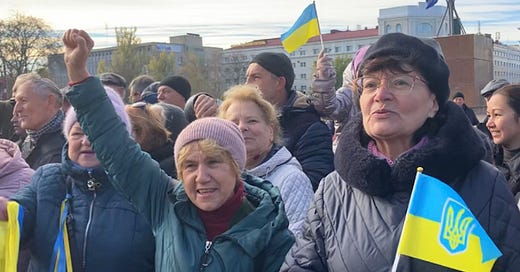


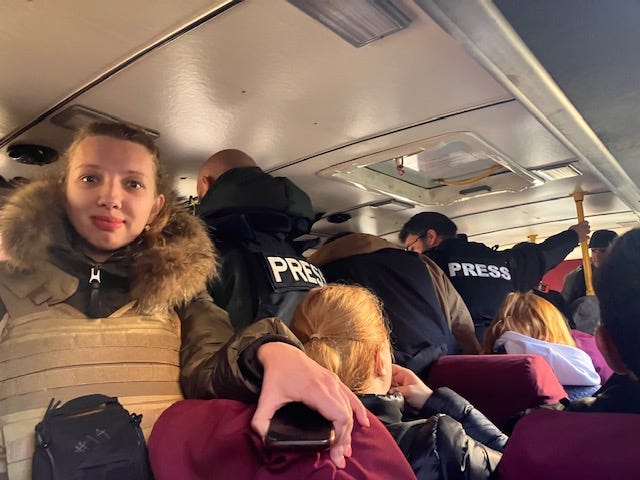
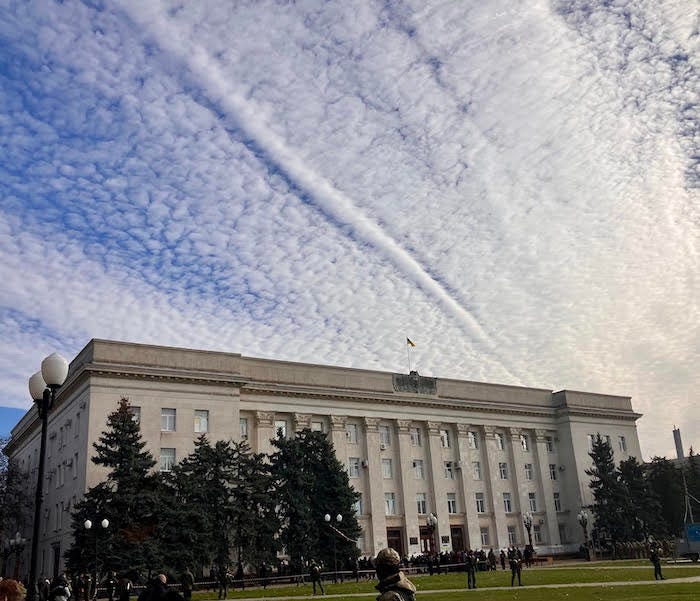
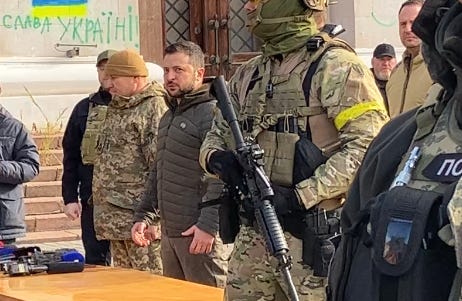
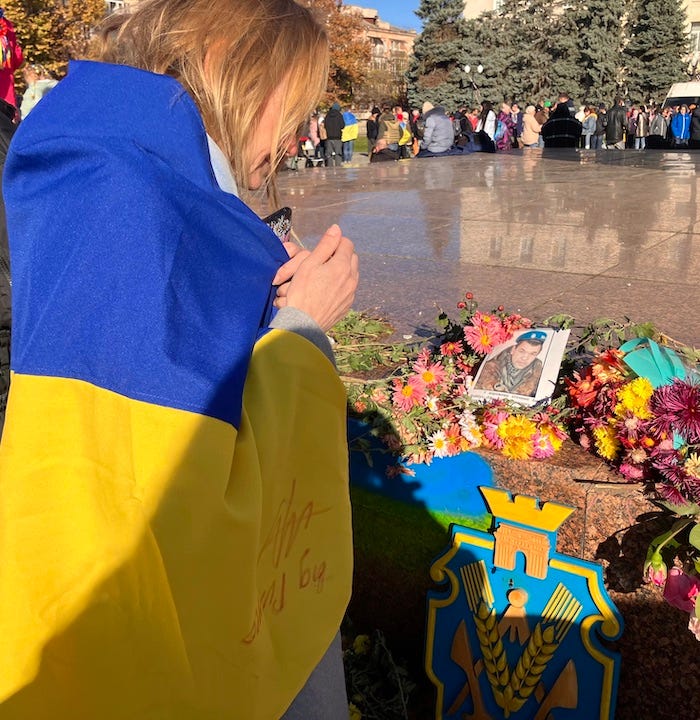
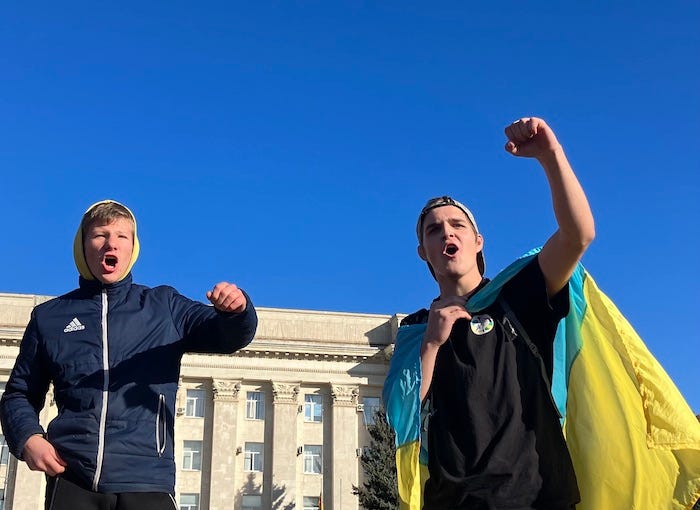
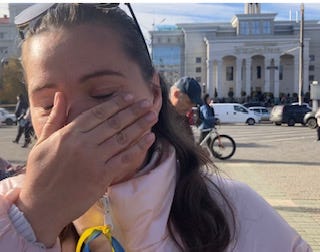

That was a visceral read. Thanks for sharing her beautiful writing. Praying for her safety (and for all Ukraine) from my warm, well-lit home.
What an incredible dispatch. I can only remember a beautiful scene of Ukraine from before Putin, when there was snow, beautiful trees and peace. May it be so again, unmarried by the ugly of war…